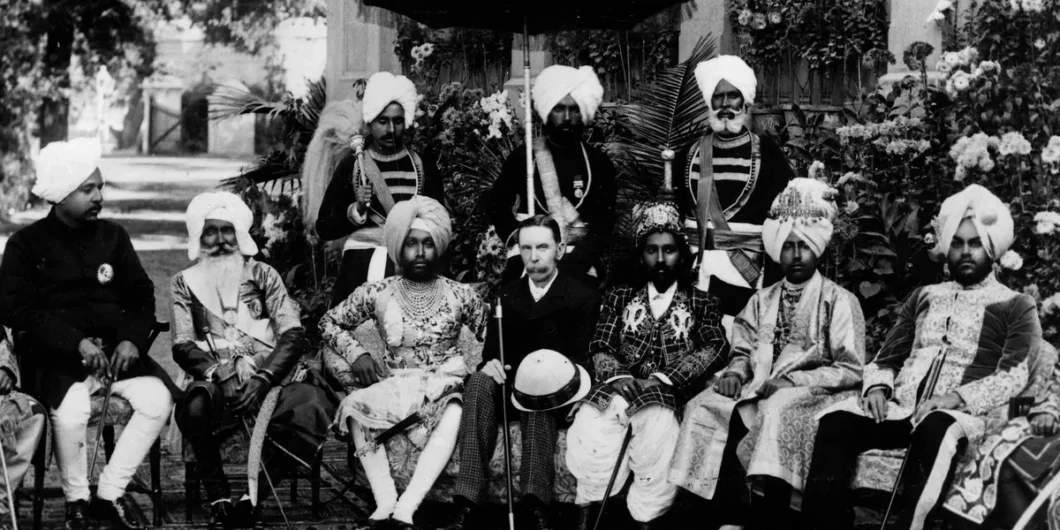A good teacher can inspire students to take charge of their own education.
Was the British Empire Really a Force for Good?
A colleague who was a Scottish history professor once observed to me the irony of the anti-imperial sentiment of contemporary Scottish nationalism. The Scots were once the organizational and managerial backbone of a mighty empire, but they are now painted simply as subjugated victims. That revisionism is, of course, ahistorical. Lost in the post-colonial narrative building is the notable fact that the Kingdom of Scotland once embarked on its own imperial adventure. The grand plan however suffered from a significant disadvantage. Scotland, the land of enlightenment, mathematics, philosophy, bravery, and rigor, lacked the requisite manpower to be an independent great power.
The early Scottish colonies were ill-defended and under constant threat of Spanish conquest and impending massacre. The resultant debt and disaster prompted Scotland towards the Act of Union with much larger England and eventually resulted in the formation of Great Britain. It was an act of pure national interest, and it eventually created an entity that, at its martial peak, painted a quarter of the globe in various shades of cerise, with political influence over another third of the world map. One might cautiously argue that Scottish nationalistic instinct is still remarkably similar. They just see an interest in being part of a newer empire in its formative stage, the European Union.
But was Scotland just a hapless victim of a rapacious empire? And was the empire truly rapacious? The Scots, up until very recently, did not believe that. They pretty much ran the British empire and were often considered the more tempering moral influence over Anglo stoicism and ruthless realpolitik.
Nigel Biggar OBE, the emeritus regius professor of moral and pastoral theology at the University of Oxford, attempts to address such questions and more, in Colonialism: A Moral Reckoning. Biggar—whom I am privileged to know personally—is also a theologian and ethicist by training, a Scotsman, and an Anglican priest and canon of the Christ Church Cathedral, Oxford, and follows the long tradition of Scottish evangelism. His book attempts to answer a simple question, that while the Empire and the Raj had flaws, and occasional dire slip-ups, overall, it was a moral force for global good.
The book is categorically not a work of history. It bypasses the arithmetic approach. Biggar’s aim is straightforward. “What now follows is not a history of the British Empire, but a moral evaluation of it,” he writes. Biggar divides the chapters into moral ills of humanity, and then examines the evidence addressing the morality of the British empire.
For example, he writes, that dedicated to anti-slavery missions, “at its height, the West African station employed 13.1 percent of the Royal Navy’s total manpower.” The British state, and by virtue, the British taxpayers, paid for this noble mission for decades. Biggar writes that “in 1845 the Slave Trade Act authorized the Navy to treat as pirates’ Brazilian ships suspected of carrying slaves, to arrest those responsible and to have them tried in British Admiralty courts,” resulting in treaties that banned slavery “to the Americas in 1822 and to the more important Persian Gulf in 1845.”
The tone of the book is therefore not detached. That may be partly by his training as a priest, and his natural instinct to see the moral side of the debate. And there is a long tradition of that when it comes to Scottish contribution to colonial education and enlightenment.
Consider that Scots were overwhelmingly influential in the proliferation of Western education in India and Africa. Scottish missionaries and philanthropists such as David Hare, Henry Montgomery Lawrence, Alexander Duff, and Stuart Hogg helped form the institutes of higher education such as Presidency College, Hare School, and Scottish Church College. Scottish evangelism resulted in high-profile upper-caste conversions of poet Michael Madhusudan Dutt and scholar Rev Krishna Mohan Banerjee, the founders of the Bengal literary renaissance. It was Reverend Banerjee, a Hindu Brahmin who later converted to Presbyterianism, who wrote a treatise on Hindu philosophy in English and was given a scholar’s post in the newly formed Asiatic Society in Calcutta, which still carries the logo of Sir William Jones in its journal.
Likewise, it was British Sanskritists such as William Jones who first dated the Mauryan empire (often touted as the greatest Hindu empire by current Hindu reactionaries). James Princep deciphered the Brahmi script that helped understand the age of Ashoka and Buddhism in India. Imperial officers such as Macaulay, Elphinstone, and Munro formed the basis of what eventually would be the backbone of the Indian civil service and judiciary. Since the 1830s, 27 universities and 498 colleges were created in a land where there were no institutions of modern education, English, science, and history. The Young Bengal movement, uniformly founded by Hindu Brahmins and other upper-caste landlords was influential in spreading Western education, and in turn, taking high official positions from judges, and professors, to Rai Bahadurs. The overarching contribution to modern India’s formation, the study of modern Indian history, anthropology, archaeology, sciences, and arts, and the debt that Indians have to the British, remains frankly, unpayable.
To argue that the empire was fundamentally a force driven by morality and emancipatory instincts on the one hand, or by immorality on the other, will be a ridiculous endeavor either way.
Similarly, when Englishmen first arrived in the southern parts of Africa, they were not able to find a civilization that had either written scripts or any modern knowledge of irrigation, mechanics, or transportation. And yet, Biggar writes:
in the early 1860s the famous Christian missionary, physician, and explorer David Livingstone lobbied for the establishment of British imperial administration in the Shire Highlands of what is now Malawi, in order to provide a stable political environment for the development of cash crops and commerce as a necessary alternative to the trade in slaves.
Perhaps, the most transformational was the British attempt at the emancipation of women, often working with unpopular local reformers. Biggar writes about the abolition of Sati (forcible Hindu widow burning), “the governor-general, Lord William Bentinck, supported by Hindu reformers such as Dwarkanath Tagore and Raja Ram Mohan Roy, who assured him that the practice had no basis in the Hindu sacred scriptures, had decided to abolish it. This he did in Bengal in 1829, extending the law to Madras and Bombay in 1830. As it happened, the social and political disturbances that Malcolm and others had feared were minimal.”
It wasn’t always smooth. “Elsewhere, colonial challenges to native practices did kindle a fierce reaction. In the 1920s Christian missionaries in central Kenya launched a concerted campaign against the custom of female circumcision—known by its opponents as female genital mutilation (FGM)—that caused serious upset among Kikuyu Christians. One consequence of this may have been that, in January 1930, a sixty-three-year-old female missionary was attacked in her bed at Kijabe and forcibly circumcised before she was murdered.” It would be interesting to mention, that the same emancipation of Bengali women, also rode on the back of British capital and investments. The opposition was from parts of leftwing Indian nationalist intelligentsia. Sarat Chandra Chatterjee, for example, wrote his reactionary tomes opposing what he called the degradation of women working in clothing mills.
At the risk of simplification, there are fundamentally two ways of studying a historical moment or event. One way is a strictly neutral cost-benefit assessment where a historian attempts to chronicle the event from the benefit of historical distance and detachment, attempting at every single instance to negate his own biases with counterfactuals and evidence, and let the readers decide on the morality of it all. Consider Thucydides rejecting the “romantic element” or Tacitus claiming true neutral history should be sine ira et studio. The other way is one of narrative construction. Consider Herodotus, or for that matter, the 1619 Project while we are at it.
Neutrality is a tough instinct and act to follow. Most current historians are incapable of even cursory attempts at neutrality or analytic rigor. The relative decline of the discipline within academia for various reasons, but notably due to the abrogation of any attempt towards even nominal narrative neutrality, is self-explanatory. Added to that, for too long, left-wing historians and post-colonial activists have disputed the more traditional cost-benefit analysis of history, especially that of imperialism. The recent uproars against Bruce Gilley, Tirthankar Roy, or even the President of the American Historical Association, James H. Sweet, are all evidence of that moralistic trend towards narrativity. History as an academic discipline is determined to self-annihilate and true historical studies, one can hope will live outside the towers of activist academia.
Biggar however bypasses all that and cuts the Gordian knot, instead focusing on the ethical evaluation of the empire. And an ethical evaluation this book does, changing the central thesis from the question of whether the British Empire did any good, to whether any good was done due to the British Empire.
The distinction is clever and important. It allows Biggar to ignore the exceptions to the rule. Britain of course didn’t do it all due to a centralised framework guided above all by morality. That would be preposterous to argue. British history is not just Bentinck or Lansdowne. It is also Castlereagh, Canning, Curzon, Chamberlain, and Churchill. They were all part of the same global force. Some did some things for the right reason, some for the wrong, or some misguided. Some were moralists, some realists, but all were in favor of what they considered to be British imperial interests. To argue that the empire was fundamentally a force driven by morality and emancipatory instincts on the one hand, or by immorality on the other, will be a ridiculous endeavor either way.
But given that every attempt of modern history is a form of activism, and therefore a narrative, a counter-narrative is perhaps a better way to provide some balance to the current post-colonial nonsense of considering the empire to be only a force of destruction. It is not true either way. And that is why this book will be considered important.



